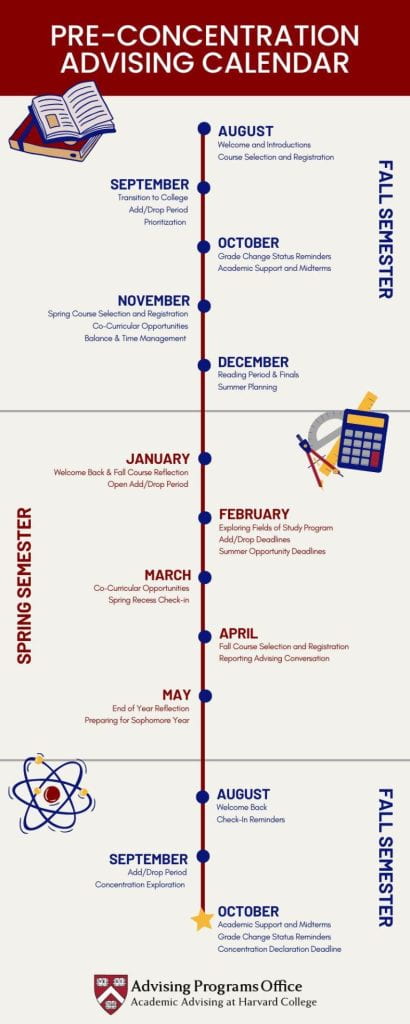Pre-Concentration Advisors
Pre-Concentration advisors help Harvard students transition to college life and academics, explore their academic interests, and plan their academic pathways.
Pre-Concentration Advisors assist undergraduate students- from their matriculation through concentration declaration– in shaping a coherent course of study, planning for academic opportunities like research and study abroad, forming connections with faculty, and balancing their intellectual and personal lives. Upon concentration declaration, students transition into departmental advising structures.
Pre-Concentration Advisors come from across Harvard University and many volunteer their time and knowledge to provide quality academic advising to Harvard College undergraduates. In addition to our volunteer corps, approximately 65 proctors serve as academic advisors to students in their entryways, working at the intersection of academic and residential life on campus. Similarly, a cohort of several preceptors advise, bringing the value of their academic expertise across divisions (Arts & Humanities, Social Sciences, and Science & Engineering) to the role. These three groups in tandem make up Harvard College’s Pre-Concentration Advisors.

Learn More About Pre-Concentration Advising
Current Harvard University faculty, staff, and some graduate students are eligible to serve as volunteer Pre-Concentration Advisors.
If you are interested in learning more, watch the recording of our recent information session below!
Advisor recruitment has begun for the Class of 2028. If the information below aligns with your interest in serving Harvard College students, we encourage you to submit our expression of interest survey by clicking the button below. A member of the Advising Programs Office will review your submission and be in touch at the end of March 2024 to confirm your eligibility to serve.
Pre-Concentration Advising Role and Responsibilities
The Advising Relationship
Students at Harvard College are introduced to a large first-year advising network inclusive of their first-year Academic Advisor, Proctor, Resident Dean (RD), and Peer Advising Fellow (PAF). These relationships are important ones that are built around trust, mutual understanding, and initiative on the part of both the advisor and the advisee. Each advisor provides unique perspectives and experiences to help inform advisee pathways and future goal setting. As such, advisors are expected to:
- Provide informed individual support
- Be knowledgeable of the Harvard College curriculum, academic policies, and resources
- Be accessible, responsive, and proactive
- Foster reflection
Key Responsibilities
- Complete advising questionnaire in early summer to help the APO match advisees
- Organize meetings with advisees during the course selection periods each term and communicate pertinent deadline, event, or resource information via email
- Facilitate advising conversations that foster academic exploration and reflection, and encourage the use of campus resources
- Enter advising notes and lift course enrollment holds in my.harvard
- Consult regularly with community of advisors and escalate any serious concerns to the Resident Dean of First-Year Students
It is important to note that concentration declaration occurs during a student’s sophomore fall semester, typically at the end of October. Therefore, all Pre-Concentration Advisors commit to serving their advisees for three semesters (or 14 months).
Meeting with Advisees
Advisors meet with their advisees two to three times each semester (advisors are responsible for the scheduling and organization of advising meetings).
Encouraging Academic Exploration and Reflection
- Understand the Harvard College curriculum and degree requirements
- Discuss academic interests as they relate to course selection and ongoing course experiences
- Encourage students to examine their conceptions of success and foster resilience when students face setbacks
- Ask advisees to consider co-curricular academic opportunities such as research or study abroad
Navigating Campus Resources
- Develop familiarity with campus resources and opportunities
- Encourage advisees to take initiative and seek help when needed
- Empower advisees to develop relationships with faculty and staff
- Refer advisees to specific resources, people, and offices as appropriate
